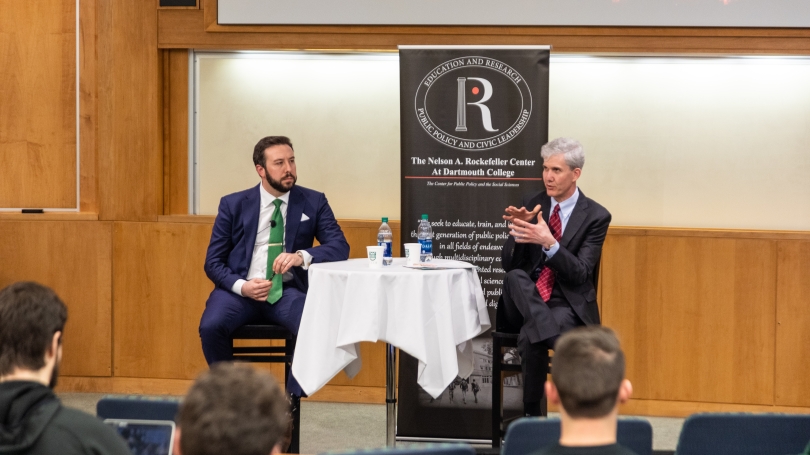
- Public Policy
- Leadership
- Funding
- News & Events
- About the Center
Back to Top Nav
Back to Top Nav
Back to Top Nav
Back to Top Nav
On Monday, April 8, 2019, current Founder and CEO of Develop LLC Steve Glickman spoke in a fireside chat with Dean Matthew Slaughter on Opportunity Zones, a new tax incentive program enacted under the December 2017 tax bill. The event was the Portman Lecture in the Spirit of Entrepreneurship.
Steve spoke passionately about the potential of the program to drive private capital to real estate and various other sectors in approximately 8,700 low-income areas. When asked of the selection process that led to these Opportunity Zones, he offered his praise for the work done by state and local governments in curating the list. Governors were given criteria and general guidance but ultimately had a high degree of agency in selecting their own zones. Steve felt that of the more than 8,000 zones selected, there were less than 200 that he disagreed with.
Steve also spoke to the program’s long path to enacted legislation. Though it often enjoyed bipartisan support, it would be through a fairly random set of circumstances that led the program to law, including the unexpected support of President Trump. Led by Senators Tim Scott (R-SC) and Cory Booker (D-NJ), at several points the program wielded the support of more than 100 co-sponsors before finally reaching its current status.
When asked by Dean Slaughter and students about his career path that led him to Develop LLC, Steve explained his distinguished career in politics before landing in the private sector. In a former life, he served in the Obama Administration as a senior economic advisor at the National Security and National Economic Councils. Prior to that, he was Chief of Staff for the U.S. and Foreign Commercial Service at the Department of Commerce. Before that, he worked in legal roles in the Department of Justice, Capitol Hill, and the Democratic National Committee.
Steve was not shy, however, about his preference for his new work. The government “is not a very entrepreneurial place,” he remarked. Since entering the private sector, Steve co-founded the Economic Innovation Group with Sean Parker and John Lettieri before moving on to Develop LLC. In his new role, Steve acts in an advisory capacity for investors hoping to participate in Opportunity Funds as well as the Opportunity Zones marketplace more broadly.
Several students voiced concerns about the potential unintended consequences of Opportunity Zones, such as dislocation of the low-income populations that have lived there for generations. While Steve acknowledged that dislocation may be a problem in some cities, he spoke with optimism about the effects of the program in a majority of Opportunity Zones. Specifically, he alluded to cities that have a lot of room to grow, such as Birmingham, Detroit, Louisville, and Cleveland. Further, Steve argued that local governments have various tools at their disposal to curb gentrification and ensure that the benefits of the program are distributed as they were intended.
Steve concluded the discussion speaking on the importance of orienting policy to place and community. Having traveled extensively through Opportunity Zones in the United States, he learned the central role place plays in so many people’s livelihoods. It is for that very reason that he feels confident that Opportunity Zones will succeed, as they will harness the power that spatial relationships bear in people’s economic, social, and cultural activities.
-Written by Taylor Morrell ’19, Rockefeller Center Student Program Assistant for Public Programs